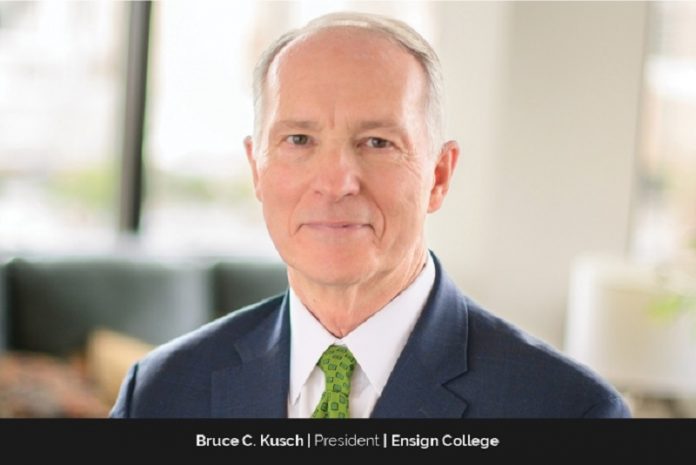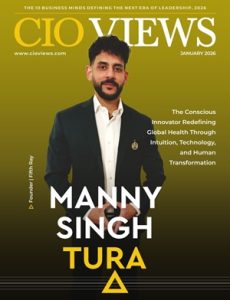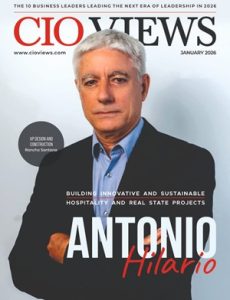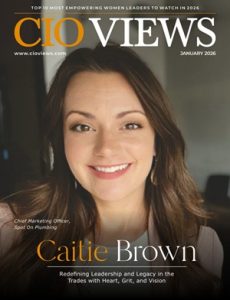Dr. Bruce C. Kusch President of Ensign College spent two decades in the fast-paced environment of Silicon Valley, CA, before moving into the field of higher education in August 2002, when he joined the Business Management faculty at Brigham Young University–Idaho in Rexburg, Idaho. “I was inspired to take this step based on the experience one of our children had there. I felt I had something to contribute. I had always had a love of teaching and wanted to play a role in preparing the rising generation as they prepared for a competitive and demanding workplace,” Dr. Kusch says.
With the firm belief that a student’s educational experience should emulate what they experience in the real world, Dr. Kusch is passionate about “integrated and immersive education” and is implementing innovations in learning and teaching to ensure that higher education adequately trains tomorrow’s workforce.
Preparing Students for The World of Work
In July 2008, Dr. Kusch was named the Associate Academic Vice President for Curriculum and began thinking more deeply about the effectiveness of curriculum and teaching methods in higher education. Experiences in this role led him to develop a TEDx talk, in which he notes that graduates today will likely switch careers ten to fifteen times throughout their working lives, often taking positions in entirely new fields that haven’t even been imagined yet. But since we don’t experience the world in discrete, separate pieces, why should education be any different?
“We live our lives as one great integrated whole. If higher education has the responsibility to prepare students for the world they will encounter following graduation, why don’t we teach in a way that truly prepares them? Too many employers say graduates are not prepared, while institutions of higher education pat themselves on the back for doing a great job of preparing graduates. There’s a huge gap and Ensign College is trying to do its part to close the gap. For us, preparing students for the world of work is second nature; it’s simply what we do,” he explains.
Career preparation, job readiness, and skills are designed into the student experience in every course taught at Ensign College. “We can only do it for our graduates, but we feel we’re doing it quite successfully. 93 percent of our students are employed one year after graduation in the career path they studied at Ensign College,” Dr. Kusch reveals.
“Students at Ensign College will strive for more than training. With hope in their hearts, students here should have a zeal for learning. Even so, training and learning are but stepping stones. The ultimate aim of true education is the building of character. One trains only for tasks, while character becomes the substance of one’s eternal identity.” – Russell M. Nelson, Chairman of the Executive Committee of the Board of Trustees, Inaugural Remarks, 13 October 2009
A Faith-Based Institution of Opportunity
Ensign College, founded in 1886, is an institution owned and operated by The Church of Jesus Christ of Latter-day Saints which also operates the sister institutions of BYU, BYU-Hawaii, BYU-Idaho, and BYU-Pathway Worldwide. It was historically a two-year institution offering certificates and associate degrees in nearly 30 disciplines. In February 2020, it was announced that the name of the school would change from LDS Business College to Ensign College on September 1, 2020.
In addition, the College was authorized by its Board of Trustees to offer a limited number of Bachelor of Applied Science degrees, effective the Fall Semester of 2021. The degrees were BAS in Business Management, Communications, and Computer Information Systems. Beneath those named degrees, they offer eight different options.
As a faith-based institution, the mission of Ensign College is “…to develop capable and trusted disciples of Jesus Christ.” Dr. Kusch explains, “To be capable means that our graduates are prepared with the skills and abilities employers are seeking. To be trusted signifies our graduates are people of integrity, guided by a moral compass – characteristics so badly needed today. A commitment to be loyal followers of Jesus Christ throughout their lives is the most important of all our core values. Everything we do must lead to mission fulfilment and student success.”
Ensign College is an institution of opportunity with about 28 percent first-generation college students. “We love this and welcome them warmly. Ensign College is the perfect place for someone just starting college, or for someone returning to finish what they once started or has the need to obtain new skills,” Dr. Kusch maintains. The ultimate goal of the College, to produce graduates who live with integrity, is encompassed in a statement from Henry B. Eyring, 1st Vice President, Board of Trustees, on 13 October 2009 at the Ensign College Presidential Inauguration:
“There is another change outside our control that will have deep effects on our students and this college. It is that society is becoming more secular. A decrease in the belief in a living God who is actively involved in the lives of His children and who works according to immutable laws of justice as well as mercy will contribute to an erosion of personal integrity and morality.
There will be pauses in that decline. We can see today that people across the world are anxious to avoid the tragedies which have come from a lack of personal standards. There is a great cry for reform. There will be periods of improvement. But until there is a change in hearts the decline in personal integrity will resume and then continue.
Every regulatory commission, every new set of rules, will have little lasting effect until people change inwardly. And the change of heart that is required comes not from good intentions but from God. A decline in the moral sense will create tragedies but also opportunities for those people and those institutions who understand both the value of personal and moral integrity and its sources. Your graduates must have an inner moral compass which will make of them ever more rare and ever more valued.”
Creating Job-Ready Graduates with In-Demand Skills
Since its inception, Ensign College has focused on educating students with in-demand skills that employers are seeking. In 1900, that meant teaching bookkeeping and stenography; in 2023 it means being a leader in preparing students for fields like cybersecurity and global supply chain management.
The strategic relationship Ensign College has forged with BYU-Pathway has allowed it to offer more of its applied curriculum online. While it serves approximately 2,700 students each year on its Salt Lake City campus, Ensign College is educating nearly 7,000 online students each semester in more than 100 countries.
Over the past several years, the College has introduced innovations in learning and teaching that incorporate the essential skills employers are seeking today. Dr. Kusch shares that many students have told him, “I came to Ensign College and discovered I could accomplish more than I ever thought possible.”
“Statements like that are the heart and soul of what we do. We value innovation and believe our innovative approach to bachelor’s degree design is unique, as is our applied curriculum. We value the worth of every single student. I’ve said: ‘At Ensign College, we love every ONE.’ I’ve also said that ‘the worth of an individual student is not measured by grade point average or SAT or ACT scores’,” he maintains.
“Students who think they have limited potential come to recognize that they have found hope, where they thought they could not hope and can dream dreams they had thought were impossible.” – Henry B. Eyring, 1st Vice President, Board of Trustees, 13 October 2009, Ensign College Presidential Inauguration
Closing The Skills Gap with Real-World Knowledge
A 2018 study conducted by the American Association of Colleges and Universities found that while 87 percent of employers surveyed said the ability to apply real-world knowledge and skills was their #1 priority for college graduates, only 39 percent of graduates could actually do that. Ensign College’s approach to education aims to close that gap – at least for its graduates.
Dr. Kusch insists that the skills that Ensign College students gain are not just technical or “hard” skills. An integral part of every course is the development and acquisition of what he refers to as “College-Wide Capabilities.” These are demonstrable skills in Teamwork and Leadership, Communications, Technology, Problem-solving, and Professional, as shown in the graphic below:
“The question is not: What is their ACT score? The question is: What can they become?” – James E. Faust, 2nd Vice President, Board of Trustees, 7 April 2004
Noting that his TEDx talk addresses Ensign College’s contribution to redefining education, Dr. Kusch says, “It’s hard to describe the growth and success in just a few words; the past three years have seen dramatic change and dramatic growth in the overall trajectory of the institution. However, we stay abreast of important issues through regular conversations with employers who advise us on our curriculum. We’ve organized program advisory boards for every academic discipline, which includes more than 100 employers. We have also been very innovative in our approach to applied curriculum design.”
At Ensign College, teams made up of faculty, employers, instructional designers, and subject matter experts follow a process that allows the creation of powerful, high-quality, applied courses in one semester at a very low cost. “I’m not certain I would describe us as a prestigious institution; however, I believe our reputation as an educational innovator is beginning to spread – at least in our region. I rather doubt many other institutions in the country can duplicate our model or the speed, quality, and cost with which we create our courses,” says Bruce.
Dr. Kusch reveals that there are some significant and very exciting plans for Ensign’s future in the works and that by early 2024, all of its curricula will be available for online delivery. Through Ensign’s relationship with BYU-Pathway, their global online population will continue to grow dramatically, especially in Africa. He anticipates serving nearly 14,000 online students each semester around the world by 2026 or possibly 2027 and believes this will open up many paths to new opportunities.
Moving Toward a New Direction and New Ways of Doing Things
When Dr. Kusch became President of Ensign College in April 2017, he felt the school had much more potential than it was realizing. The strategy wasn’t particularly clear, and they were chasing “shiny objects” that were not core to their institutional purpose. Early on, he had to make some difficult decisions to stop doing things that did not contribute to mission fulfilment.
Following Jim Collins’s recommendation in his book, Good to Great, to be sure they had ‘the right people on the bus,’ resulted in more difficult decisions and significant institutional change, and Dr. Kusch felt that it was essential to help every employee recognize the importance of their contribution and to buy into a new direction and new ways of doing things.
“There was an existing feeling of ‘strategy or program du jour’ and an attitude of ‘I’ll just wait this out, like all the other things that have come and gone.’ I was determined in the direction I felt the school should go and did not relent in leading out and communicating the importance of change,” he recalls.
One very significant change was reworking Ensign’s mission statement in the fall of 2017, which changed the culture of the entire institution. “Before the change, a well-intentioned mission statement had been implemented, but it was so lengthy no one could remember it and seldom referred to it. The new mission statement is short, concise, memorable, and powerful,” Dr. Kusch remarks.
Once the mission statement was changed, it became the standard measure for everything they did. They especially focused on hiring for mission fit for new faculty and staff and evaluating current employees for the same, which contributed to their ability to overcome any challenge that came their way.
Hiring For Mission and Cultural Fit Is Essential
“Our people are committed to our mission, that that makes all the difference in the world,” Dr. Kusch declares. “We’ve learned that hiring for mission and cultural fit is absolutely essential. As we’ve focused on this, it’s resulted in remarkable achievements by remarkable people. Hiring remarkable people means hiring people who are motivated. I believe that every one of our employees is motivated by our mission. They live it. They’re committed to it. That makes motivation rather easy.”
Ensign’s mission statement change, name change, the addition of bachelor’s degrees, and growth in online education are seen as remarkable, and Dr. Kusch points out that this was only possible because of the excellent employees that come to work every day committed to providing Ensign College students the best educational experience possible.
Dr. Kusch notes that Ensign’s system is very unique as presidents are appointed by the Board of Trustees and are not selected through an application process. During his tenure, he has established the institution as a viable and respected contributor to the work of the entire educational system.
As the president, Dr. Kusch is responsible for every function of the institution, including representing it to the Board and representing the direction given by the Board to the institution. The college has done some things to recognize its employees, like a monthly breakfast to recognize employee birthdays. Twice a year, it recognizes outstanding leaders for campus service and leadership. “My wife and I have personally served meals to our employees that we personally prepare,” he reveals.
As an educator, Dr. Kusch feels that he’s had the privilege to teach and learn from some exceptional students who are now accomplishing amazing things in their homes, families, and careers. It’s not unusual for him to receive a thank you message from a former student, and that to him is as gratifying as anything he’s accomplished as someone with a formal leadership position.





